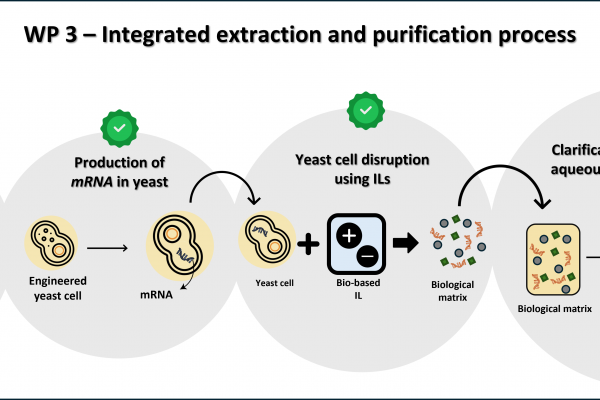University of Aveiro Delivers Key Contribution to the Yscript Project
The Yscript team has spent the past years working on an ambitious goal: developing sustainable and cost-effective methods to produce mRNA in yeast cells. This technology is seen as a promising way to make the production of vaccines and medicines faster, more affordable, and more widely accessible.
A crucial contribution comes from the University of Aveiro in Portugal. The team at the CICECO – Aveiro Institute of Materials led the work package Integrated extraction and purification process, contributing towards the design of an innovative strategy to efficiently purify mRNA produced in yeast.
At the heart of their approach lies the use of bio-based ionic liquids (ILs). These allow yeast cells to be carefully broken open, releasing the mRNA. Afterwards, aqueous biphasic systems (ABS) are applied to enrich and clarify the target mRNA, while separating it from unwanted contaminants. The result is an integrated process feasible of scale-up that could pave the way for large-scale production.
“Our research shows that we can rely on bio-based and sustainable methods to make mRNA manufacturing not only more efficient but also more cost-effective,” explains Mara G. Freire, who led the Aveiro research group and coordinated the work package.
Young researchers also played a central role in this achievement:
“For our team, it was an exciting challenge to align all steps of the process chain and achieve a working proof of concept,” says Augusto Pedro, Junior Researcher at the University of Aveiro.
A past Yscript video series provides vivid impressions of the work carried out by young researchers at the CICECO Institute: https://www.yscript.eu/media/video
The outcomes are highly promising – and demonstrate great future potential: the approach developed in Yscript could enable the large-scale production of mRNA from yeast. This opens the door to groundbreaking medical applications, including new vaccines, therapies for respiratory diseases, and even novel cancer treatments.
As the project concludes in September 2025, Yscript delivers not only scientific insights but also a key step towards a more resilient and sustainable healthcare system.






